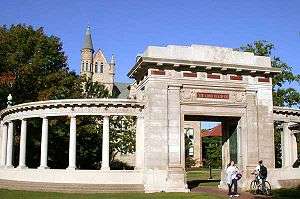Asa Mahan
| Asa Mahan | |
|---|---|
| 1st President of Oberlin College | |
|
In office 1835 – 1850 | |
| Succeeded by | Charles Grandison Finney |
| Personal details | |
| Born |
Asa Mahan November 9, 1799 Vernon, New York, U.S. |
| Died |
April 4, 1889 (aged 89) Eastbourne, England, U.K. |
| Spouse(s) |
Mary Hartwell Dix (m. 1828; d. 1863) Mary E. Munsell (m. 1866) |
| Children |
Anna J. (1829-1911) Lucy D. (1831-1880) Theodore S. (1834-1863) Mary K. (1837-1924) Sarah S. (b.1840) Elizabeth M. (b.1843) Almira (b.1846) |
| Alma mater |
Hamilton College Andover Theological Seminary |
| Profession | Minister |
| Religion | Congregational |
| Website | Asa Mahan Presidential Papers, 1764-1995 |
Asa Mahan (November 9, 1799 – April 4, 1889) was a U.S. Congregational clergyman and educator and the first president of Oberlin College and Adrian College.
Biography
Career
Asa Mahan graduated from Hamilton College in 1824, and from Andover Theological Seminary in 1827. On November 10, 1829, he was ordained pastor of the Congregational church in Pittsford, New York, and in 1831 he was called to the pastorate of a Presbyterian church in Cincinnati, Ohio, named Lane Seminary. He accepted the presidency of the newly founded Oberlin College in Oberlin, Ohio, in 1835, simultaneously serving as the chair of intellectual and moral philosophy and a professor of theology. Mahan's liberal views towards abolitionism and anti-slavery greatly influenced the philosophy of the newly founded college; likewise, only two years after its founding, the school began admitting students of all races, becoming the first college in the United States to do so.[1]
The faculty of Oberlin College quarreled frequently with the highly religious Mahan, and eventually the faculty voted unanimously to relieve him of his position as president. In his place, famed abolitionist and preacher Charles Finney (already an Oberlin professor) was made president of Oberlin College. Heartbroken, Mahan moved to Cleveland, Ohio and participated in the founding of Cleveland University, located in the Tremont District of the city, where he was chosen president of the school and also professor of mental and moral philosophy. However, the school had trouble attracting students and went bankrupt after only a few years, and Mahan was forced out.[2]
Pastoral work
In 1855 he resumed pastoral work, and had charge of Congregational parishes at Jackson in 1855-57 and at Adrian in 1857-60. Mahan moved to England in 1874, where he published frequently until his death in 1889.
Personal life
Mahan married Mary Hartwell Dix (d.1863) in 1828, with whom he had seven children. She died in 1864, and two years later, in 1866, he remarried to Mary E. Munsell (1814-1894).
Works
Mahan was an active advocate of the religious view known as Christian Perfection, and published Scripture Doctrine of Christian Perfection on the subject. His other works include System of Intellectual Philosophy, The Doctrine of the Will, The True Believer: his Character, Duties, and Privileges, The Science of Moral Philosophy, Election and the Influence of the Holy Spirit, Modern Mysteries Explained and Exposed, The Science of Logic, Science of Natural Theology, Theism and Anti-Theism in their relations to Science, The Phenomena of Spiritualism scientifically Explained and Exposed, Critical History of the late American War, A System of Mental Philosophy, Critical History of Philosophy, Out of Darkness Into Light "Misunderstood Texts of Scripture" and "The Baptism of the Holy Spirit" (to which is added "The Enduement of Power" by C. G. Finney).
See also
References
- ↑ Oberlin College Archives (2003-03-30). "Biography: Asa Mahan (1799-1889)". Retrieved 2008-03-27.
- ↑ Ohio History Central (2005-07-01). "Asa Mahan". Retrieved 2008-03-27.
